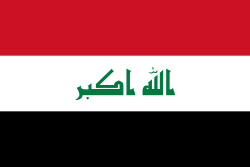| National Card البطاقة الوطنية (Arabic) كارتى نيشتمانى (Kurdish) | |
|---|---|
| Type | Compulsory identity document |
| Issued by | |
| First issued | September 13, 2015 |
| Purpose | Citizenship and Identification |
| Valid in | |
| Eligibility | Iraqi citizenship |
| Expiration | 10 years after issuance |
| Cost | 6,000 dinar (first/renewal) |
The Iraqi National Card is an biometric identity card issued by the Ministry of Interior from January 1, 2016. It replaced the Nationality Certificate and Civil Identification Document and the Residency Card. This card has a high security platform and is connected directly to the Iraqi Civil System, and can be used to travel within Iraq and Syria.
